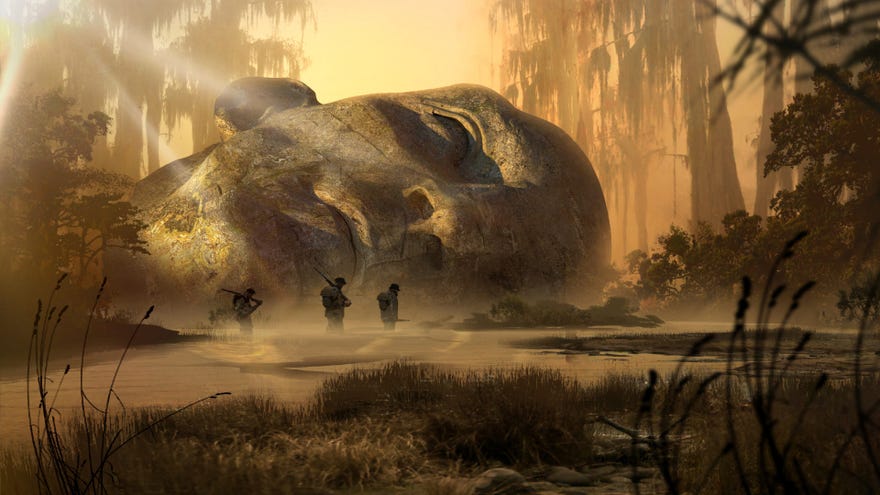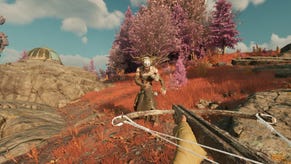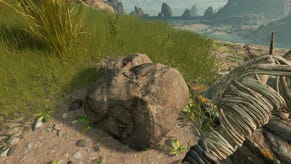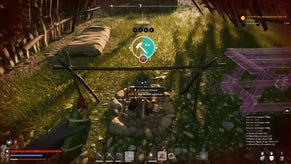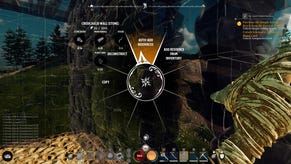Nightingale's closed alpha tests revealed one glaring omission: doors
"They were somewhere in our schedule," say Inflexion, but "people's estates were constantly under attack."
It's been a full year since ex-BioWare boss Aaryn Flynn and his new studio Inflexion announced Nightingale at The Game Awards. In case you've forgotten, Nightingale is a PvE crafting survival game with a strong Victoriana vibe, but since our chat with them back at Summer Games Fest in June, and an early access delay into the first half of 2023 to accommodate the switch to Unreal Engine 5, we haven't heard too much about the game.
I got to natter with Flynn, director of production Leah Summers, and art director Neil Thompson earlier this week, ahead of the debut of a new trailer for Nightingale at The Game Awards this evening. They filled me in on how the game's blend of fairies and reality-hopping realmwalkers has progressed over the past year - and it turns out that players have had a lot to do with it.
The team tell me that the last twelve months have been satisfying for the studio, particularly since the game’s closed alpha test began in October and feedback from players started to roll in. Summers points out that realmwalkers can now encounter one of the top player-requested features: doors. “They were somewhere in our schedule, and then after one of our playtests, and people’s estates being constantly under attack, someone said, ‘Doors please,’” Flynn laughs. “And one of our developers took it upon themselves to put doors in.”
Feedback has spread into the whole crafting system too, which Inflexion originally saw as “artisanal”. Though Flynn insists that the the option to “sit there and tinker” with creations is still a core part of Nightingale’s crafting, they also now appreciate that “production line crafting”, in his words, is another UI tweak that came from the first batch of realmwalkers. “You want to refine 100 ore into ingots, right? You want to craft it by turning a bunch of wood bundles into lumber, and you want to fire something up, let it go. Now on to my next task,” Flynn tells me. “And that became abundantly clear to us on that. So the UI has been adjusting to support that better.”
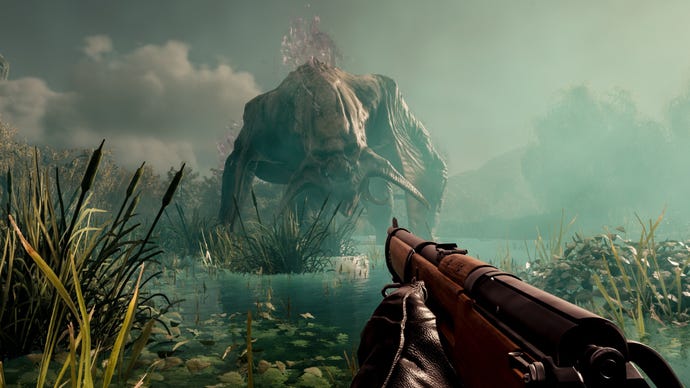
The team say they’re also getting the thumbs up from players for the Nightingale’s Realm Cards, which adjust the parameters of the three different types of procedurally generated realm (desert, swamp, and forest) that it’s currently possible to portal into. Thompson tells me that there’s plenty of scope for variation in how the realms look with just those three for now, and the kinds of environmental challenges within. Inflexion are hoping to eventually add more types of biomes with unique things to do there.
Realm Cards look to be one of Nightingale’s standout features, letting you adjust pretty much whatever you want about a realm before you trek through a big glowing hole into it. Things such as the type of environment, buildings, and encounters are shaped by what Realm Cards you call upon, along with the resources you’ll find inside. Cards let you buff and debuff the realm too, if you’re feeling a wee bit cocky or timid on any given day. “You might play a card that gives you 25% less damage from creatures when you're in a realm,” Flynn says. “That might be a very valuable card to play, and so it's a card you might covet in a recipe that you might keep to yourself, or you might share with your friends.”
“We intend it to be a very dynamic interface with Realm Cards, so that all sorts of things can change and adjust there,” he adds. When I ask if Inflexion will ever monetise the Realm Cards, Flynn tells me that might happen. It would only be cosmetic elements like card backs, though, not the attributes of the cards themselves.
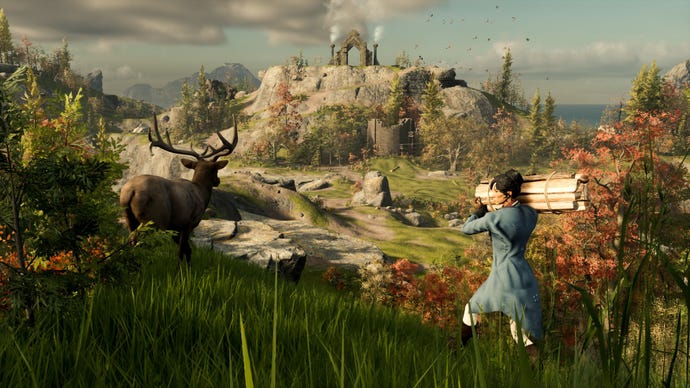
Each of Nightingale’s realms measures around four square kilometres. I ask if players can build their structures to fill up an entire realm, and Flynn tells me that isn’t possible yet. “You can make some pretty cool villages for players so, especially if you’ve got you and some friends, you can each have your own little estates and they can kind of abut each other.” Thompson explains that there’ll be options to customise your base with multiple architectural styles, should you fancy it.
“You can start with a shack base, and then build a wonderful Tudor extension and top it off with some Gothic architecture on there made of stone,” Thompson says, “so there's plenty of extensibility.” I prod him to see how tall you can build your gaff, after seeing Nightingale’s cool flying umbrellas in the new trailer shown at The Game Awards. Flynn tells me three floors is probably the limit for now, but Thompson points out it’s possible to build a structure over the side of a cliff for some extra reach.
I think I’d like to set up an umbrella flying school when I get my hands on Nightingale, but Flynn takes the wind out of that by pointing out an umbrella won't automatically let you take to the skies. “Yeah, our game tries to be relatively grounded,” he tells me, no pun intended. “And then there are magical exaggerations and magical things that come along. So, yes, you do have to enchant your umbrella before you can just do that.” We take a moment to mourn future realmwalkers who watch the trailer but don’t test their bumbershoot before they hurtle out of their cliffside Gothic-Tudor manor house, to be dashed on the rocks below.

Speaking of untimely demises, Inflexion are still ironing out just how some aspects of survival in Nightingale function too. The team rethought how death works in the game pretty recently, for example. “We actually just changed that last week,” Flynn says. If you died in Nightingale before, and weren’t brought back to life by a pal, then you’d wake up at home base with no gear at all. "And so you were naked and afraid, and had to run back and try to reclaim your stuff."
Inflexion thought that was a bit much, particularly for solo players. Now, revivified realmwalkers will keep whatever’s on them when they cop it, but lose the stuff in their backpack. That’ll stay where they died and wait to be reclaimed. Watch out though, because dying means you’ll be cursed.
“You can start with a shack base, and then build a wonderful Tudor extension and top it off with some Gothic architecture on there made of stone."
In order to lift the curse, you’ll need to either just wait it out, trek to get your missing goodies back, or use a concoction to remove the bad mojo. “Really, what's important to us is that players have clear strategic choices they can make about how to proceed, and they'll do what works for them,” Flynn says. “So if it makes sense to go back and get your stuff, go get it. If you're like, ‘I barely had anything in there, it's not worth my time’, you don't have to do that either.”
The team tell me they’d “love to pay off” a return to Nightingale City, the magical metropolis the game’s named after, for dedicated realmwalkers one day. Flynn reckons that would have to play out over perhaps a year of storytelling and game updates. “And then eventually, can you?” he wonders. “Can you do all the incredible things necessary to unlock a portal back to Nightingale City itself?”
Like No Man's Sky and Grounded before it, Nightingale's fantastical premise is a different spin for the often grim survival games genre. I'm intrigued by its offbeat combination of fairies, Sliders-esque alternate worlds, and Mary Poppins-style flying umbrellas, and I'll be keeping an eye on how future closed playtests change it further.
The game's early access release on Steam and the Epic Games Store is still a ways off - sometime in the first half of 2023 - but there'll be another beta taking place between January and March.
For more of the latest news and trailers, check out our Game Awards 2022 hub. We also live-blogged the show as it happened right here.
